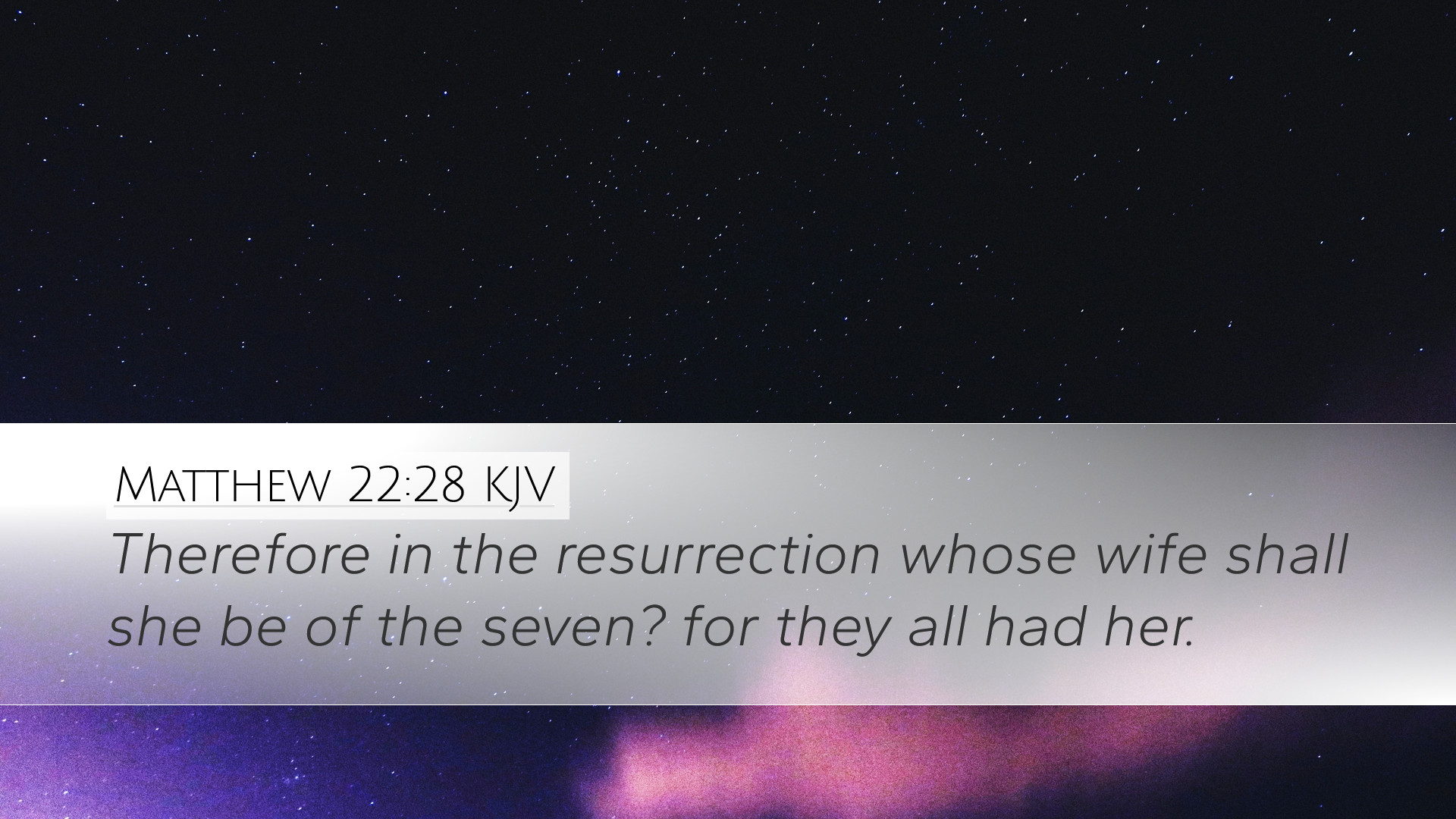Commentary on Matthew 22:28
Verse: "Therefore in the resurrection, whose wife shall she be of the seven? for they all had her."
Contextual Overview
This verse is positioned within a critical dialogue between Jesus and the Sadducees, a Jewish sect that denied the resurrection of the dead. The Sadducees posed a hypothetical situation to Jesus regarding a woman who had been married to seven brothers sequentially, questioning the nature of her marital status in the resurrection.
Insights from Matthew Henry
Matthew Henry observes that the inquiry posed by the Sadducees reflects their misunderstanding of Scripture and the power of God. He notes that their perspective is rooted in an earthly and limited view of relationships. Henry emphasizes the importance of acknowledging God's capacity to transcend human concepts, particularly concerning the eternal state post-resurrection.
Key Points from Henry's Commentary:
- Human Limitations: The Sadducees attempt to use a complicated scenario to undermine the belief in resurrection. Henry suggests that they do not comprehend the fullness of God's plan.
- Retribution and Reward: He posits that earthly relations will not be carried over to the heavenly realm, as our existence in the afterlife will be fundamentally different.
- Affirmation of Resurrection: Henry underscores the necessity of believing in the resurrection, which is central to Christian doctrine.
Insights from Albert Barnes
Albert Barnes provides a detailed examination of the passage, emphasizing theological clarity regarding marriage and resurrection. He stresses that the Sadducees misinterpret the nature of life after death.
Key Points from Barnes' Commentary:
- The Nature of Resurrection: Barnes suggests that in the resurrection, believers will possess a different state of existence, one that does not resemble earthly life.
- Separation from Earthly Ties: He argues that earthly institutions, such as marriage, serve their purpose in this life but will not extend into the afterlife.
- The Sadducees’ Intent: He highlights the insincerity of the Sadducees, noting that they were not genuinely seeking understanding but were instead attempting to trap Jesus.
Insights from Adam Clarke
Adam Clarke presents a comprehensive theological analysis, considering the implications of the resurrection and the nature of divine relationships. His commentary touches upon historical interpretations and the need for scriptural integrity.
Key Points from Clarke's Commentary:
- God’s Sovereignty: Clarke highlights that God is not confined to human logic or systems. The Sadducees’ argument is flawed because it assumes earthly logic applies to heavenly realities.
- Principle of Eternal Life: He emphasizes that life after death embodies a new order where the relationships as known on earth will be irrelevant.
- Examination of Scriptures: Clarke urges readers to explore the Scriptures more deeply, as they contain the keys to understanding issues of life, death, and resurrection.
Theological Implications
Collectively, these commentaries reveal significant theological implications concerning the nature of life after resurrection. The verse challenges traditional views of marriage, using the Sadducees' argument to illustrate how earthly concerns should not cloud the understanding of divine promise.
Resurrection Hope: The overarching theme found within these reflections is the assurance given to believers about life beyond death. The concept of resurrection is vital for understanding God’s redeeming work.
Transformation of Relationships: In the resurrection, believers will experience relational dynamics transformed by holiness and glory, where earthly institutions no longer apply.
Pastoral Applications
For pastors and theologians, this passage serves as an opportunity to educate congregants about the significance of resurrection faith. The discourse teaches the importance of grounding one’s beliefs in scriptural truth rather than human reasoning.
Recommendations for Teaching:
- Encourage Discussion: Facilitate conversations around misconceptions regarding the afterlife, examining Scripture's teaching on the subject.
- Emphasize Hope: Remind congregants of the biblical promise of resurrection, instilling hope and confidence in God’s eternal plan.
- Address Questions: Be prepared to answer challenging questions about life after death with compassion and scriptural emphasis.
Conclusion
Matthew 22:28 presents a profound teaching moment that emphasizes the supremacy of divine revelation over human supposition. The interpretations by Henry, Barnes, and Clarke collectively affirm an understanding that the resurrection brings a transformative reality that transcends earthly relationships. Its study encourages deeper theological insight and pastoral application, equipping believers to embrace the fullness of life in Christ.


